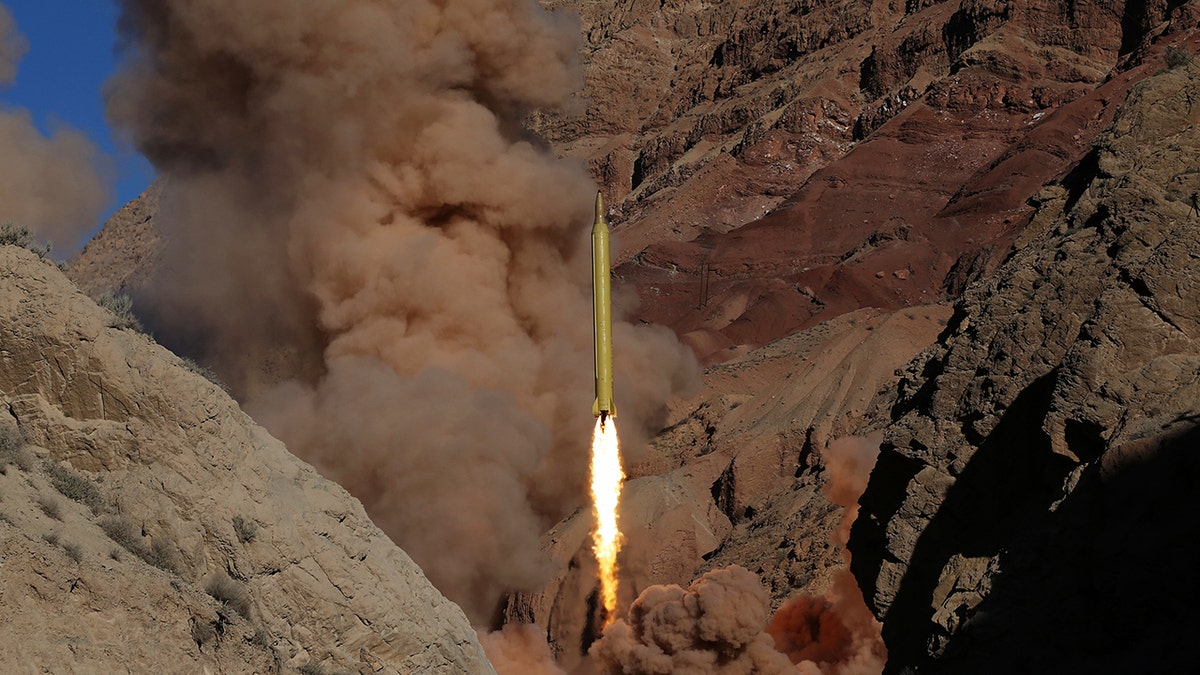
An Iranian Qadr H long-range surface-to-surface missile is fired during a 2016 maneuver in Iran. (AP Photo/Fars News Agency, Omid Vahabzadeh)
Saudi Arabia has built a factory to make its own ballistic missiles, according to a report, the latest sign of the kingdom's ramped-up efforts to arm itself against a threat from Iran.
An expert with the Middlebury Institute in Washington D.C. said on it appears the Saudis have built the base at a location near al-Watah, not far from the capital city of Riyadh.
David Schmerler, who helped discover the Saudi base, told Al-Jazeera in an interview that a site already known to be associated with a missile base had recently been built up, and now houses buildings that would be used in the testing and production of solid fuel ballistic missile.
"Saudi Arabia does not have any other large-scale solid fuel production facilities in the country, so this would be a significant leap forward for them," Schmerler reportedly said.
The existence of a ballistic missile program would beg the question about the Saudis desire or capability to arm the missiles with nuclear weapons. The kingdom doesn't currently have nuclear weapons, though Crown Prince Mohammed bin Salman has spoken of his desire to have them, according to reports.
The Saudis' main motivation would be to stand up against Iran, which cut a deal with the international community in 2015 to table its nuclear development. But questions about Iran's adherence to the terms of the deal were raised almost immediately after it was signed, and the Trump administration pulled out of the deal last year.
But even without nuclear weapons, Iran possesses a ballistic missile force that is in all likelihood targeted at Iran, according to experts.
"They've been launching missiles out of Yemen using Houthi rebels as a test-bed for attacks against Saudi Arabia," said Schmerler. "So it would make sends for them to try and look into developing domestic ballistic missiles because they don't have that capability at the moment".
And according to Michael Makovsky, President & CEO of the Jewish Institute for National Security of America, the Saudi interest in having their own ballistic missiles “results from Iran’s advanced ballistic missile program—which was effectively legalized by the UN Security Council resolution that incorporated the 2015 Iran nuclear deal—and the perception of US unreliability and withdrawal from the region.”
“President Trump has imposed sanctions on Iran’s program but they aren’t effective,” he said. “A stronger US posture, including shooting down Iran ballistic missiles, test-fired or otherwise, could help limit Iran’s advance and reassure the Saudis about our intentions.”
Behnam Ben Taleblu, a research fellow at the Foundation for the Defense of Democracies (FDD) concurred that Riyadh’s interest in a nuclear program comes down to an endeavor to counter the growing Iranian threat – but there are numerous other questions and causes for concern.
“Should the assessment hold true that Saudi Arabia is looking to indigenously produce solid-fueled systems, which are more road-mobile and require less preparation to launch, then it would add an additional reason to worry,” he explained. “Late in the Iran-Iraq War, Saudi Arabia procured the CSS-2 liquid-fueled intermediate range ballistic missile from China, thus providing Riyadh with its first significant missile platform. Unlike Iran, Saudi Arabia has relied on a higher-tech air force and other sources of conventional military strength to project power.”
Taleblu stressed that a key question which remains is exactly what foreign suppliers and or networks Saudi Arabis is relying on to produce procure missile technology.
“Is it China, Pakistan, or other sources,” he pondered. “And another unanswered question is, how will an uptick in Riyadh’s interest in missiles impact the regional military balance?”
The U.S. has traditionally been opposed to ballistic missile proliferation, particularly in the volatile Mideast. But successive presidential administrations have been sympathetic to Saudi Arabia's desire to defend itself against Iran.
In fact, the Saudis are buying some $15 billion worth of missile defense material and technology from the United States. The deal is moving forward despite the outcry over October's murder of dissident Saudi journalist Jamal Khashoggi.







































